How Gaming and Esports Foster Social-emotional Learning Skills
Elements of collaboration, relationship building, and creativity in the game world help shore up those strengths in the real world, including for kids whose SEL skills were dulled by pandemic-induced social isolation.
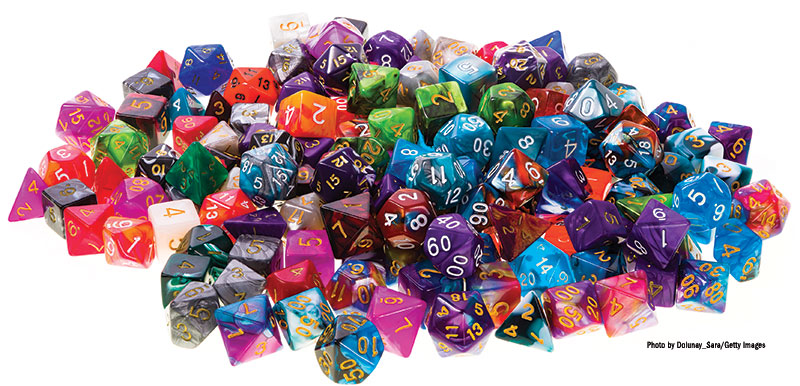
Related ArticleBeing an Autistic Dungeon Master |
Brooklyn Game Lab might look like any other storefront on its bustling city street, but it’s the only building on the block where a druid is battling a T. Rex inside.
Every Saturday, kids and teens from ages 5 to 16 gather there to play Dungeons & Dragons, the Eighties tabletop role-playing board game that has had a resurgence, popular once again thanks to the Netflix series Stranger Things.
The game hasn’t changed much over the years. Groups of players, known as a party, still enter a fantasy world, taking on the role of an elf or a wizard or any number of other magical characters. Battles are still determined by rolling multisided dice, all of it overseen by a Dungeon Master who leads players through a complex narrative campaign.
On this particular Saturday, Lirit, 13, Jasper, 11, and Takuma, 10, are deep into their quest, led by Game Lab instructor Skyla Lilly, who completed a master’s thesis about how role-playing games can help with social-emotional learning (SEL). Ignore the walls stacked to the ceiling with board games and the snacks littering the foldout table. The trio is trapped inside afuturistic version of the American Natural History Museum, facing off against an evil scientist who has just brought that aforementioned T. Rex back to life.
Before the players can attack, however, Lirit has a question.
“Can I roll for insight?”
“Sure,” says Lilly.
“What’s insight?” Takuma asks.
“It’s like finding out what someone is thinking or what their intentions are,” Lilly explains.
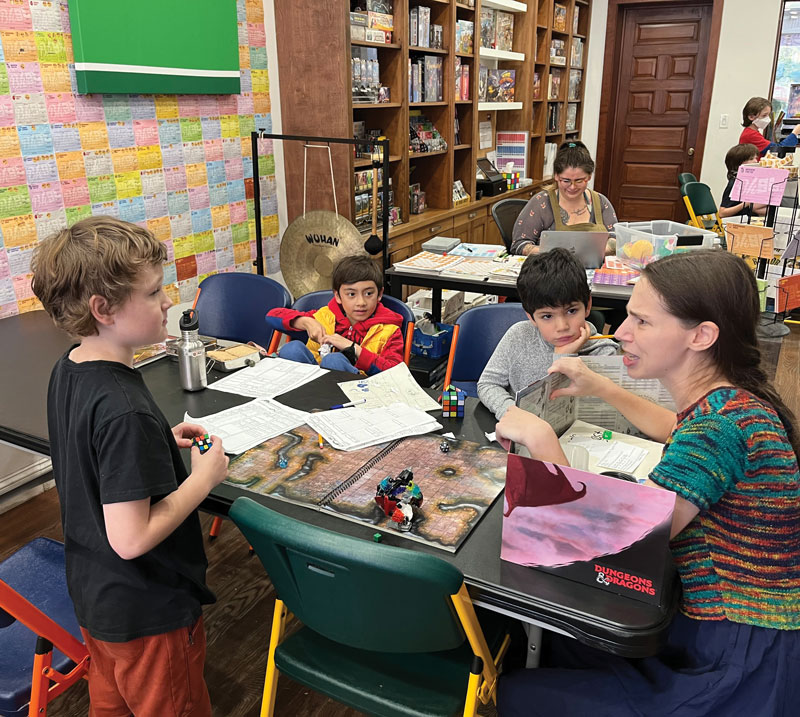 |
At Brooklyn Game LabPhoto courtesy of Brooklyn Game Lab |
For the last three years, Brooklyn Game Lab has been running a program that uses the fantasy of role-playing games to support kids in developing their SEL skills. The group today has been playing together since September, and while they’ve crafted their fictional characters, they’ve also been building their real life competencies along the way.
Increasingly, educators and librarians are recognizing the value of role-playing games to bolster SEL skills among their students. The inherent elements of collaboration, relationship building, and creativity in the game world help to strengthen those very same strengths in the real world. For many young players, those have been dulled by pandemic-induced social isolation.
SEL is often described as soft skills: non-academic capabilities like empathy or communication. Jill Pullara manages the Game Lab D&D program and says parents have sought out the Lab for their kids to work on a variety of executive functioning and social skills. “It’s a lot of communication learning, learning how to take turns, learning how to be patient, learning conflict resolution, and handling disappointment,” Pullara says.
Prior to playing, instructors at the Lab work with the kids and parents to develop personal goals. Lirit has been working on handling disappointment and self-monitoring emotions, while Takuma has been focused on staying present in conversations and using longer sentences to express his thoughts.
Strategies learned during play seep into the real world. One player, Lucy, started using a tool during games to write or draw ideas to organize her thoughts. She then began using the same tool in school. Another player, Felix, struggled with confrontation, but after playing D&D told his parents that since he knew his character could face similar challenges, he knew he could, too.
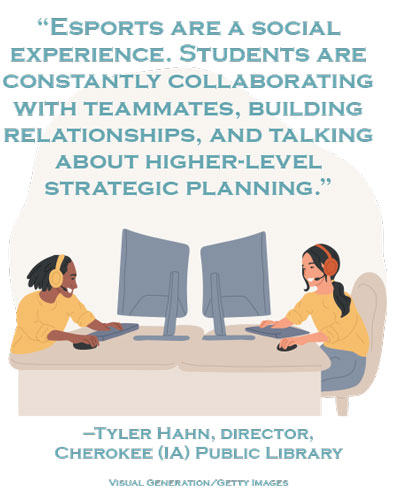 A game that relies on collaboration
A game that relies on collaboration
While play and fun are a big part of it, there’s a third component that makes D&D so useful for teaching SEL skills: it’s an inherently cooperative game. Rather than competing against one another, players have no choice but to work together if they want to win. But the benefits of the game don’t stop there.
“D&D is a game that has so many different aspects. It teaches empathy, problem solving, creative thinking, negotiation,” says Lucas Maxwell, head librarian at Glenthorne High School in South London, UK. Since 2019, Maxwell has been running a popular D&D program at the school.
What began as a group of about half a dozen students has now branched into multiple campaigns, with those original students now running games for younger students. There’s even a waitlist to join. “It’s something that builds community,” Maxwell says. “I’ve seen these groups become friends, and over the last three years, it’s an extremely tight-knit group. They talk about the experiences they’ve shared. It’s a way to build these positive memories in the library.”
The impact goes beyond the library. Maxwell says teachers have commented to him that they notice students who are more positive about school in general, and others who never picked up a book before who are now poring over manuals and novels related to D&D.
It’s not only board games that can play a role in teaching kids SEL skills. Tyler Hahn is the director of the Cherokee (IA) Public Library and works closely with the local school district. He was instrumental in bringing an electronic sports team to the middle school.
Like D&D, esports require students to hone their communication, collaboration, and creative thinking skills, and also serve as an important foundation for building relationships. A Pew Research report found that video games can play a key role in teen friendships, particularly among boys.
“Esports are a very social experience,” Hahn says. “Students are constantly collaborating with teammates and even different schools. They are building relationships and talking about higher-level strategic planning for not only their games, but growth over the season.”
Just like traditional school sports teams, the Cherokee esports crew meets regularly to train and compete, with a fall season for fifth and sixth graders and a spring season for seventh and eighth graders. There’s about an even split between boys and girls who play. During practices, players build relationships with teammates while developing perseverance for when things go wrong. They discuss different strategies, and even watch videos of their matches to get ready for competitions against other schools.
Most importantly, esports fill an important social need.
“From the fifth and sixth grade perspective, 90 percent of these students aren’t involved in any other extracurricular activity,” Hahn says. “Video games and esports are their extracurricular activity. It’s keeping them attending class and being a part of the environment of the school.”
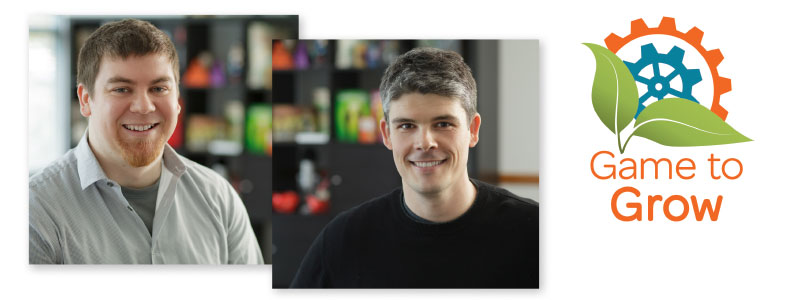 |
Game to Grow founders Adam Johns and Adam DavisCourtesy of Game to Grow |
Practice makes perfect
Whether online or in real life, gaming provides a safe space for kids to practice the skills that can seem daunting to master in their everyday lives. That’s the reason Adam Davis co-founded the Seattle-based nonprofit Game to Grow in 2017. As a former classroom teacher with training in drama therapy, he was frustrated that older students who needed support developing their social skills lacked options.
“There’s this funny thing that happens with a lot of kids who need social supports. Young kids have play groups, that’s how we support them to feel socially capable, but when they get older, we put them in talk therapy,” Davis says. “We don’t let them participate in unstructured social play. We teach them how to make eye contact and be socially adept. They need to fit in and camouflage according to what society wants from them.” The message many kids and teens hear: hide the way your brain works.
Katie Lear agrees. She’s a licensed clinical mental health counselor specializing in childhood anxiety and OCD who launched her own virtual D&D therapy program, Young Dragonslayers, when the pandemic began. Lear says that a lot of young people who need some support don’t necessarily require intense, or expensive, one-on-one counseling. What they need is a space to learn that what they are going through is normal.
Unlike real life, where actions have serious consequences, Lear calls D&D “a playground to try out new ways to interact with people,” where the stakes aren’t so high that kids can’t recover from a mistake. Even after kids returned to in-person learning, Lear’s D&D program has remained popular, as many kids still suffer from a deficit in SEL skills.
The other nice thing about a fantasy world is that it can become whatever someone needs. Lear says she’s created modules to work on issues around bullying, building empathy, and dealing with hurt feelings. For instance, in one campaign, the only way to defeat a villain was by complimenting them. “We have also deliberately used modules or characters who represent a diverse range of experiences,” Lear says. “We have a lot of nonbinary characters, gay characters in relationships. It’s a deliberate choice to make people feel welcome.”
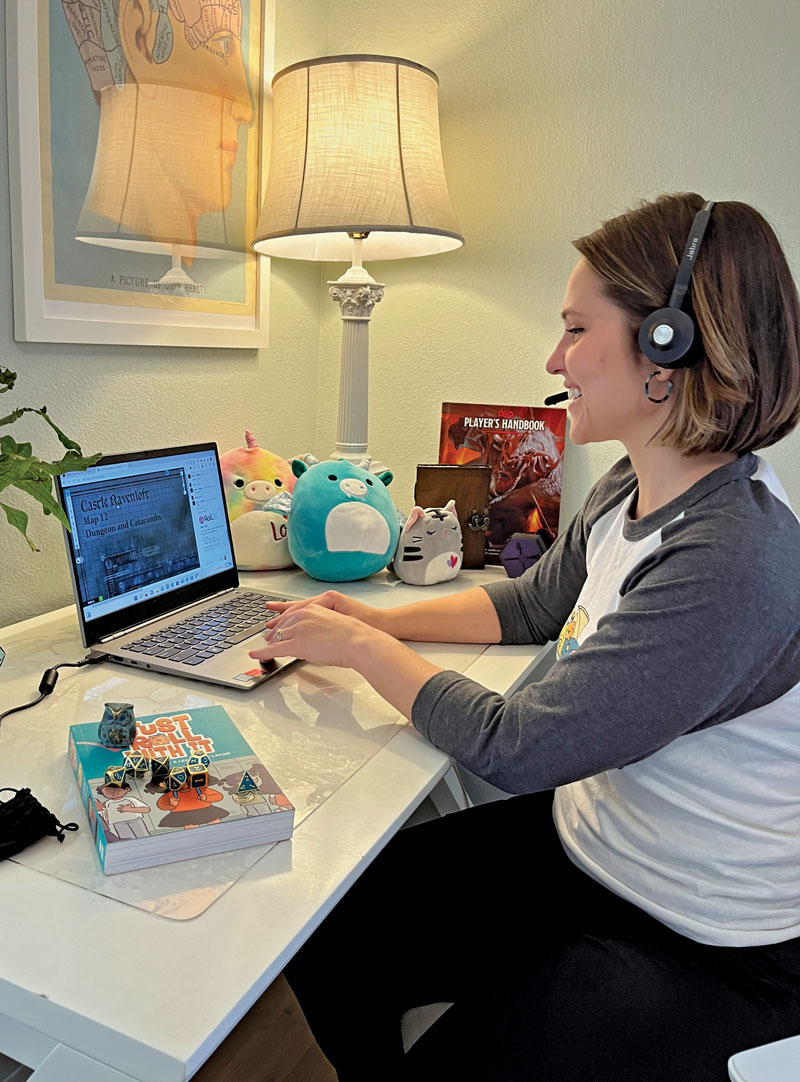 |
Katie Lear launched a virtual D&D therapy program during the pandemic.Photo courtesy of Katie Lear |
Bringing games to the library
For teachers and librarians interested in bringing games to their school, there are lots of places to start. Game to Grow offers specific training for teachers and librarians, and also donates games to libraries and schools.
Maxwell has collected what he’s learned in his book, Let’s Roll: Running a Successful Fantasy Role-Playing Programme in Your School or Public Library (Facet, Spring 2023). He says that librarians or other educators interested in launching a program should begin by picking up a D&D starter set, which includes a condensed version of the rule book and premade adventure sheets that can be photocopied. For those with no gaming experience, there are also some great alternatives.
“I always recommend the idea that D&D can be overwhelming for some and does require a lot of time, but there are others out there that don’t require as much setting up,” Maxwell says. As an alternative, he suggests Kids on Bikes, which offers a similar experience but can be set up and played in only a few minutes. It’s also great for younger players.
Technical requirements make esports a little trickier, but no less doable. Hahn says librarians or teachers should start with their school’s IT department to get things set up, then try reaching out to established esports programs for both competition and support.
“I’d say connect with others in your community. Look for other schools that have esports teams and mentors to help guide you through,” Hahn says. State esport affiliates can also be helpful, as well as larger organizations like the North America Scholastic Esports Federation.
Back at the Brooklyn Game Lab, Jasper, Lirit, and Takuma finalize their last moves. With roars of excitement, they roll dice and, after a few well-aimed attacks, the T. Rex crumbles to the floor, defeated. Then it’s back to reality—time to head home. But for these kids, knowing the fantasy world of druids and elves and even a T. Rex will be there waiting for them next time makes the real world a lot easier to handle.
“Having that one group where you’re treated completely normal and play pretend and be the character you wish you were does so much even for just those couple hours of the day,” Pullara says. “It keeps you going. It makes such a huge difference.”
Andrew Bauld is a freelance writer covering education.
RELATED
The job outlook in 2030: Librarians will be in demand
The job outlook in 2030: Librarians will be in demand
ALREADY A SUBSCRIBER? LOG IN
We are currently offering this content for free. Sign up now to activate your personal profile, where you can save articles for future viewing






Add Comment :-
Be the first reader to comment.
Comment Policy:
Comment should not be empty !!!